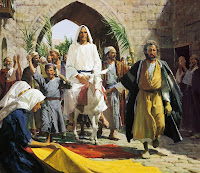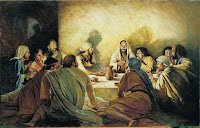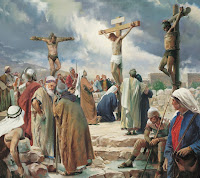I chose to do choice #1 because I wanted to learn more about the suffering the Savior went through. I am grateful for His willingness to endure all He went through for each of us. I posted this on my blog so that my daughters will know that I know the Savior atoned for us and loves us. To help understand what the suffering was like if only by reading the description. We have all felt alone during our personal sufferings and Christ teaches us how to endure it all by prayer and accepting our Heavenly Father's will.
Choice 1: Matthew 26:36-46; Mark 14:32-42; Luke 22:39-46; John 18:1-2. The Savior’s Suffering in the Garden of Gethsemane
- Review Matthew 26:36-46; Mark 14:32-42; Luke 22:39-46, making a list of words and phrases that describe the Savior’s suffering. Include in your list clarifications provided in the footnotes.
From Mark – “sore amazed”, awestruck, astonished, “very heavy”, depressed, dejected in anguish, “My soul is exceeding sorrowful unto death”, “fell on the ground”, prayed, “if it were possible, the hour might pass from him.”, called out to His Father “Abba, Father, all things are possible unto thee, take away this cup from me, “prayed and spake the same words.”
From Luke – “withdrawn from them”, “kneeled down, and prayed”, asked “if thou be willing, remove this cup from me”, “being in agony he prayed more earnestly, pain, “and his sweat was as it were great drops of blood falling down to the ground.”
Write additional insights about the Savior’s suffering in Gethsemane found in the following resources:
- Mosiah 3:7; Alma 7:11-13; Doctrine and Covenants 19:16-19
Alma 7:11-13 – “suffering pains, “afflictions”, “temptations of every kind”, “take upon him the pains and sicknesses of his people.” “he will take upon him death”, “he will take upon him their infirmities”, “suffereth according to the flesh that he might take upon him the sins of his people”
Doctrine & Covenants 19:16-19 – “suffered”, “Which suffering caused myself even God, the greatest of all,” “to tremble because of pain,” “and to bleed at every pore,” “and to suffer both body and spirit”
- The institute student manual commentary, “To What Extent Was the Atonement Completed in the Garden of Gethsemane?” (pg. 173)
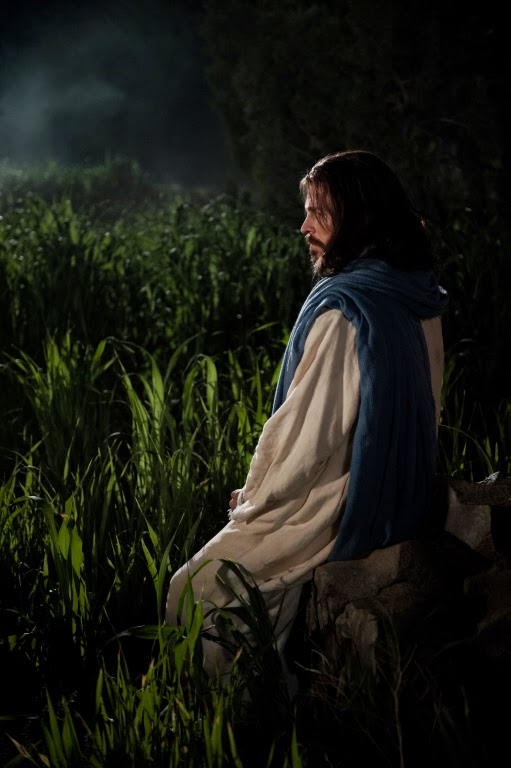 He suffered the intense pain of body and spirit all alone.
He suffered the intense pain of body and spirit all alone.To What Extent Was the Atonement Completed in the Garden of Gethsemane?
“It seems, that in addition to the fearful suffering incident to crucifixion, the agony of Gethsemane had recurred, intensified beyond human power to endure. In that bitterest hour the dying Christ was alone, alone in most terrible reality. That the supreme sacrifice of the Son might be consummated in all its fulness, the Father seems to have withdrawn the support of His immediate Presence, leaving to the Savior of men the glory of complete victory over the forces of sin and death.” (Talmage, Jesus the Christ, p. 661.)
- The institute student manual commentary for Luke 22:44, “And Being in an Agony, He Prayed More Earnestly” (pgs.173-74)
But what was it that caused the Savior’s intense agony?
“Jesus had to take away sin by the sacrifice of Himself. … And as He in His own person bore the sins of all, and atoned for them by the sacrifice of Himself, so there came upon Him the weight and agony of ages and generations, the indescribable agony consequent upon this great sacrificial atonement wherein He bore the sins of the world, and suffered in His own person the consequences of an eternal law of God broken by men. Hence His profound grief, His indescribable anguish, His overpowering torture, all experienced in the submission to the eternal fiat of Jehovah and the requirements of an inexorable law.
“The suffering of the Son of God was not simply the suffering of personal death; for in assuming the position that He did in making an atonement for the sins of the world He bore the weight, the responsibility, and the burden of the sins of all men, which, to us, is incomprehensible. …
“Groaning beneath this concentrated load, this intense, incomprehensible pressure, this terrible exaction of Divine Justice, from which feeble humanity shrank, and through the agony thus experienced sweating great drops of blood, He was led to exclaim, ‘Father, if it be possible, let this cup pass from me.’ He had wrestled with the superincumbent load in the wilderness, He had struggled against the powers of darkness that had been let loose upon him there; placed below all things, His mind surcharged with agony and pain, lonely and apparently helpless and forsaken, in his agony the blood oozed from His pores.” (Taylor, The Mediation and Atonement, pp. 149–50.
- The institute student manual commentary for Luke 22:44, “And His Sweat Was As It Were Great Drops of Blood Falling Down to the Ground” (pg. 174)
“Christ’s agony in the garden is unfathomable by the finite mind, both as to intensity and cause. The thought that He suffered through fear of death is untenable. Death to Him was preliminary to resurrection and triumphal return to the Father from whom He had come, and to a state of glory even beyond what He had before possessed; and, moreover, it is within His power to lay down His life voluntarily. He struggled and groaned under a burden such as no other being who has lived on earth might even conceive as possible. It was not physical pain, nor mental anguish alone, that caused Him to suffer such torture as to produce an extrusion of blood from every pore; but a spiritual agony of soul such as only God was capable of experiencing. No other man, however great his powers of physical or mental endurance, could have suffered so; for his human organism would have succumbed, and syncope would have produced unconsciousness and welcome oblivion. In that hour of anguish Christ met and overcame all the horrors that Satan, ‘the prince of this world’ could inflict. The frightful struggle incident to the temptations immediately following the Lord’s baptism was surpassed and overshadowed by this supreme contest with the powers of evil.
“In some manner, actual and terribly real though to man incomprehensible, the Savior took upon Himself the burden of the sins of mankind from Adam to the end of the world.” (Talmage, Jesus the Christ, p. 613.)
Read Matthew 26:36 and the institute student manual commentary for Matthew 26:36, “Then Cometh Jesus … unto a Place Called Gethsemane” (pgs. 172-73). Write a paragraph about how the meaning of Gethsemane adds insight to what the Savior experienced there.
“Gethsemane.—The name means ‘oil-press’ and probably has reference to a mill maintained at the place for the extraction of oil from the olives there cultivated. John refers to the spot as a garden, from which designation we may regard it as an enclosed space of private ownership. That it was a place frequented by Jesus when He sought retirement for prayer, or opportunity for confidential converse with the disciples, is indicated by the same writer (John 18:1, 2).” (Talmage,Jesus the Christ, p. 620.)
The feeling of being pressed physically, mentally, emotionally and spiritually is incomprehensible. In Gethsemane, Christ experienced all that was required to fulfill the requirements of Justice. He suffered so that we might not suffer. As a olive is pressed to extract oil, so was the Savior in order for Him to redeem us and know how to assist us. He knows us intimately, our pains, feelings, worries, sin, guilt and knows how to heal us. We can go to Him because of what He endured in the Garden of Gethsemane because He felt what we feel and can heal and strengthen us.
Write response to each of the following questions, looking for lessons you can apply to your own life from the example of the Savior in Gethsemane:
- What were the Savior’s disciples doing while He was praying? What had the Lord taught the Apostles in Matthew 26:41? What does His example teach about how to be obedient even when “the spirit indeed is willing, but the flesh is weak”? How does Doctrine and Covenants 10:5 apply to this verse?
In Doctrine & Covenants 10:5, Jesus pleads with us to “pray always” Prayer is the tool to overcome and endure. Prayer is protection and strength against Satan.
- Read Mosiah 15:7; 3 Nephi 11:11; Doctrine and Covenants 19:19. Write the phrases from these verses that describe what motivated the Savior to “drink the bitter cup.”
3 Nephi 11:11 – “I have drunk out of that bitter cuo which the Father hath given me”, “and have glorified the Father in taking upon me the sins of the world,” “in the which I have suffered the will of the Father in all things from the beginning.”
Doctrine & Covenants 19:19 – “glory be to the Father,”
- Write your thoughts about the Savior’s use of the word “nevertheless” in Matthew 26:39; Mark 14:36; Luke 22:42. In each of these accounts, what did the Savior initially ask for? What did He say next, using the word “nevertheless?” What does it require to submit one’s will to the Father in this way, no matter how painful or difficult the outcome might be? When have you followed the “nevertheless” pattern the Savior exemplified in these verses by submitting to Heavenly Father’s will even though it was very difficult?
- According to Luke 22:44, as the Savior’s agony became more intense, how did His prayer change? Do you feel more like praying or less like praying when you are suffering? When has it made a difference in your suffering to have turned to the Lord with more earnest prayer?
- Reflect on what you have learned about the Savior’s suffering in Gethsemane. Write a paragraph about lessons you can apply to your own life from the example of the Savior in Gethsemane.
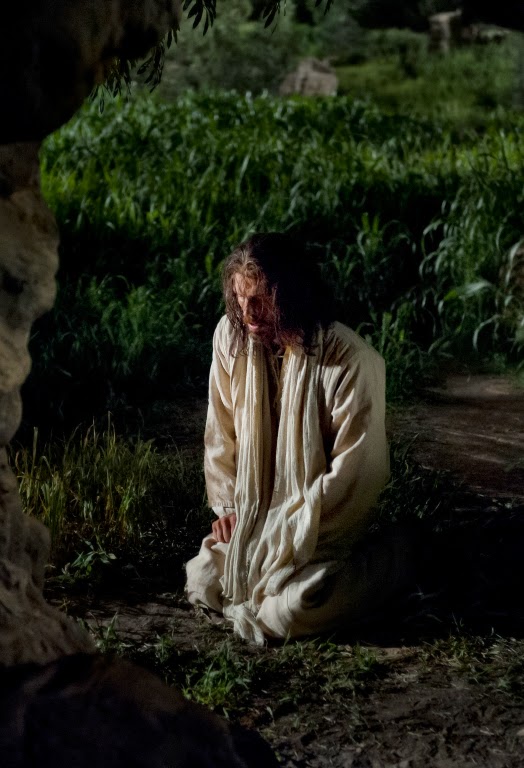
.jpg)


